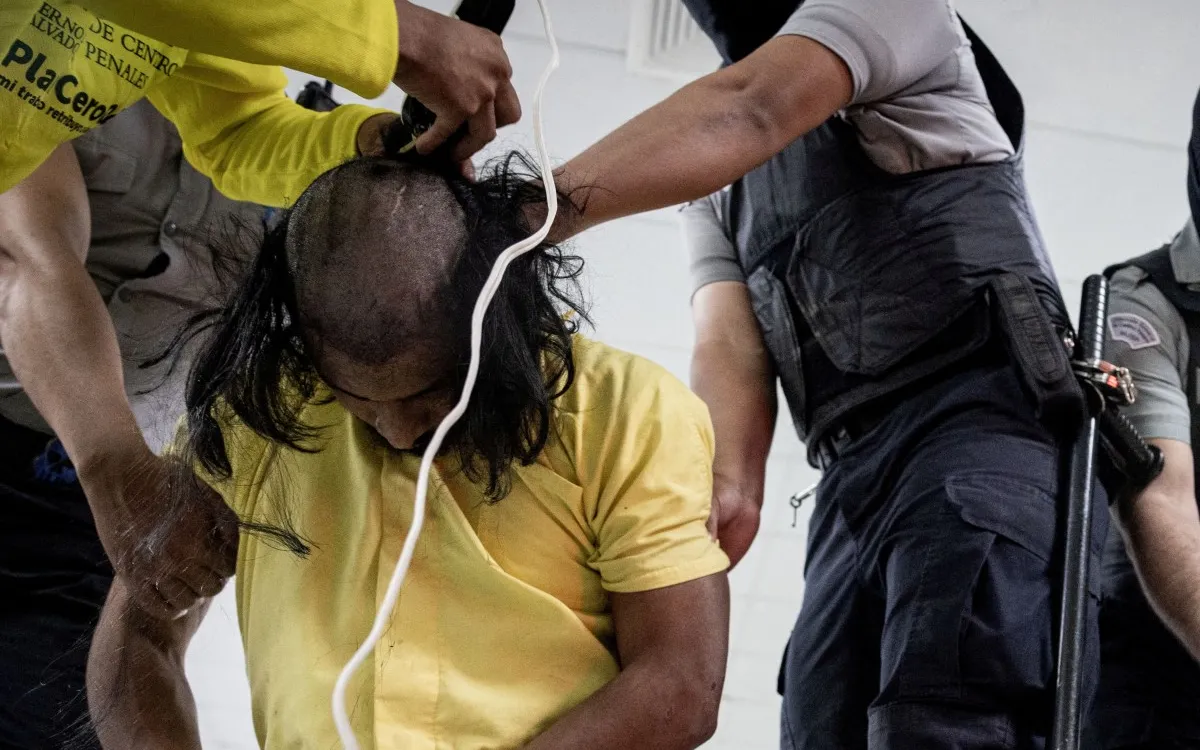
In a bold move that has sparked significant controversy, the Trump administration has deported alleged members of the Venezuelan gang Tren de Aragua from the United States to El Salvador, despite a standing court order prohibiting such actions. This deportation is part of a broader trend of the Trump administration's efforts to expel foreign nationals, many of whom lack documentation or are implicated in campus protests.
On a recent Sunday, El Salvador's President Nayib Bukele announced that his country had received 238 members of Tren de Aragua along with 23 members of the infamous Salvadoran gang MS-13. This transfer followed a prior agreement between Bukele and Secretary of State Marco Rubio, where the Salvadoran leader consented to detain these gang members on behalf of the United States. As per this arrangement, the deportees are currently held at El Salvador’s Centre for the Confinement of Terrorism (CECOT) for an initial period of one year, which could be extended.
During his inauguration speech, President Trump indicated that he would invoke the 1798 Alien Enemies Act, a law allowing the president to detain or deport noncitizens during wartime. On Saturday, Trump signed a proclamation citing this law, asserting that Tren de Aragua was “perpetrating, attempting, and threatening an invasion or predatory incursion” against U.S. territory. The proclamation stated that all Venezuelan citizens aged 14 or older who are affiliated with Tren de Aragua and are not naturalized or lawful permanent U.S. residents can be removed as “Alien Enemies.”
In response to Trump's proclamation, federal Judge James Boasberg, the chief judge of the District Court for the District of Columbia, issued a temporary restraining order aimed at blocking Trump’s ability to utilize wartime powers for deportations. This ruling was made during a hearing requested by the American Civil Liberties Union (ACLU). However, shortly after the ruling, President Bukele confirmed that the deportations had already been carried out. He commented on the situation, sharing a news article snippet about the judge's ruling and cheekily captioning it: “Oopsie … Too late,” accompanied by a laughing emoji.
The Alien Enemies Act permits U.S. presidents to detain or deport noncitizens during wartime. Initially enacted in 1798, the law aimed to prevent immigrants from aligning with potential enemies, particularly during tensions with France. Importantly, the act allows for deportations without a hearing, based solely on citizenship status. Historically, this law has been invoked only three times: during the War of 1812, World War I, and World War II.
The legality of Trump's actions has ignited a hot debate. While Trump and his supporters argue that the U.S. faces an “invasion” of undocumented immigrants, critics contend that invoking the wartime law during peacetime is a significant overreach. A report from the Brennan Center for Justice cautioned that utilizing the Alien Enemies Act to bypass conventional immigration law represents a grave abuse of power. Furthermore, the Fifth Amendment of the U.S. Constitution guarantees the right to a grand jury, with wartime being a rare exception.
The Trump administration's apparent defiance of Judge Boasberg’s order has only intensified the controversy. Patrick Eddington, a homeland security and civil liberties expert at the Cato Institute, remarked that the administration's actions were “beyond the pale and certainly unprecedented.” In contrast, White House Press Secretary Karoline Leavitt defended the administration, asserting that a single judge cannot dictate the deportation of individuals deemed foreign terrorist threats.
Leavitt contended that by the time the court order was issued, the deportees had already been removed from the U.S. However, legal experts argue that the jurisdiction of the federal court extends beyond U.S. borders. Professor Steve Vladeck from Georgetown University emphasized that a federal court's jurisdiction does not cease at the water's edge, indicating that deportees should be returned even if they had left U.S. airspace when the order was issued.
The deportees are being detained in El Salvador under a financial arrangement where the U.S. compensates the Salvadoran government for their confinement. President Bukele disclosed that the Trump administration will pay approximately $6 million to hold around 300 alleged Tren de Aragua members for a year. Notably, Venezuela has often refused to accept deportees from the U.S., leading to the decision to transfer them to third countries in Central America.
Human rights lawyer Clive Stafford Smith noted that due to strained relations, the U.S. has shifted its deportation strategy for Venezuelans. In recent weeks, Venezuela has accepted approximately 350 deportees, including around 180 who were detained at the U.S. naval base in Guantanamo Bay for 16 days.
The Centre for the Confinement of Terrorism (Centro de Confinamiento del Terrorismo) is a maximum-security prison in El Salvador designed to house up to 40,000 inmates. Currently, it is where the alleged gang members deported by the U.S. are being held. CECOT, which opened in January 2023, prohibits visitations, education, and recreational activities, ensuring that inmates do not have access to outdoor spaces.
Tren de Aragua, which translates to “train of Aragua,” is classified as a foreign terrorist organization by the U.S. Although information on the group is limited, it is believed to have been established in 2014 by Hector “El Nino” Guerrero and two accomplices while incarcerated in Tocoron prison in Venezuela. The gang allegedly orchestrated robberies, murders, and kidnappings from behind bars and has been linked to significant violence, including the murder of former Venezuelan army officer Ronald Ojeda.
Following the deportations, Trump has requested a stay of Judge Boasberg’s order from the Washington, D.C. Circuit Court. Legal experts predict that this stay will likely be denied, and Trump may subsequently seek intervention from the U.S. Supreme Court.
As the situation unfolds, the implications of this controversial deportation and its legal ramifications will continue to be closely monitored by legal experts, human rights advocates, and the public.